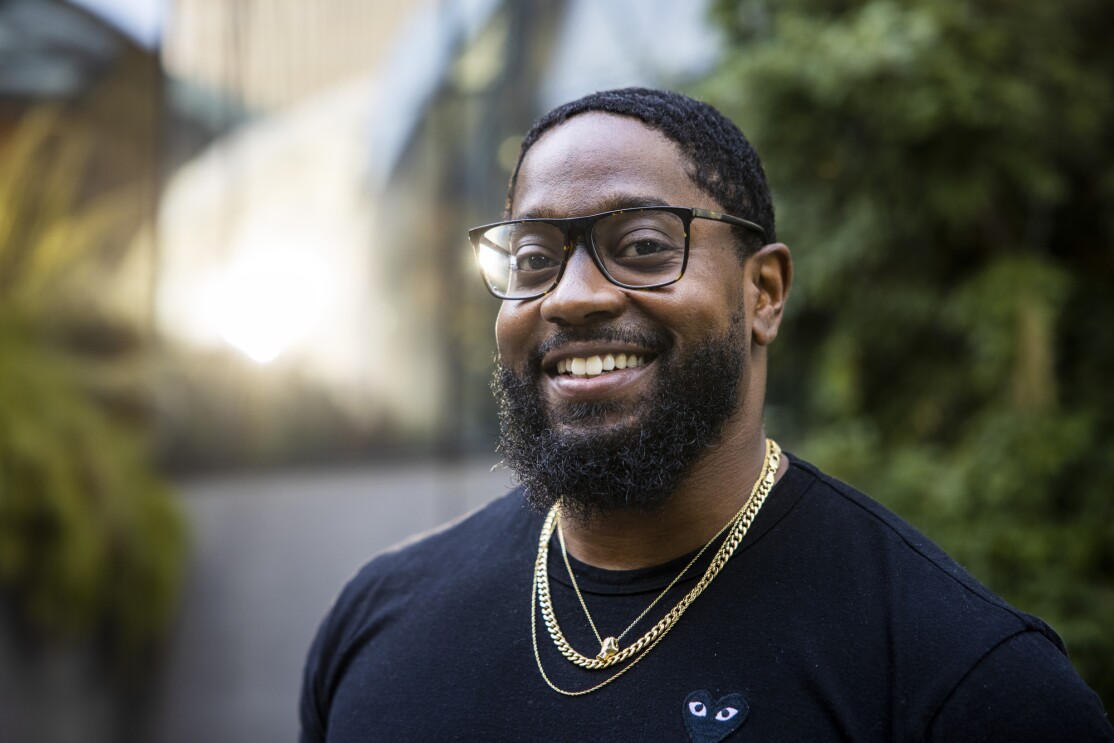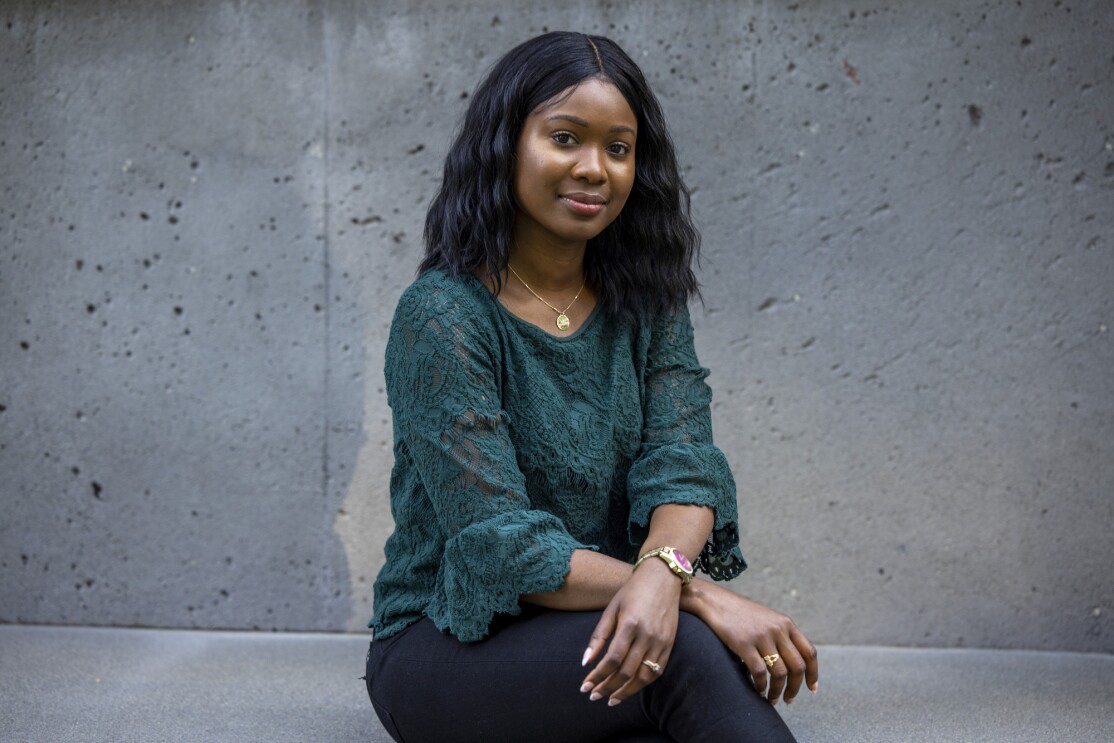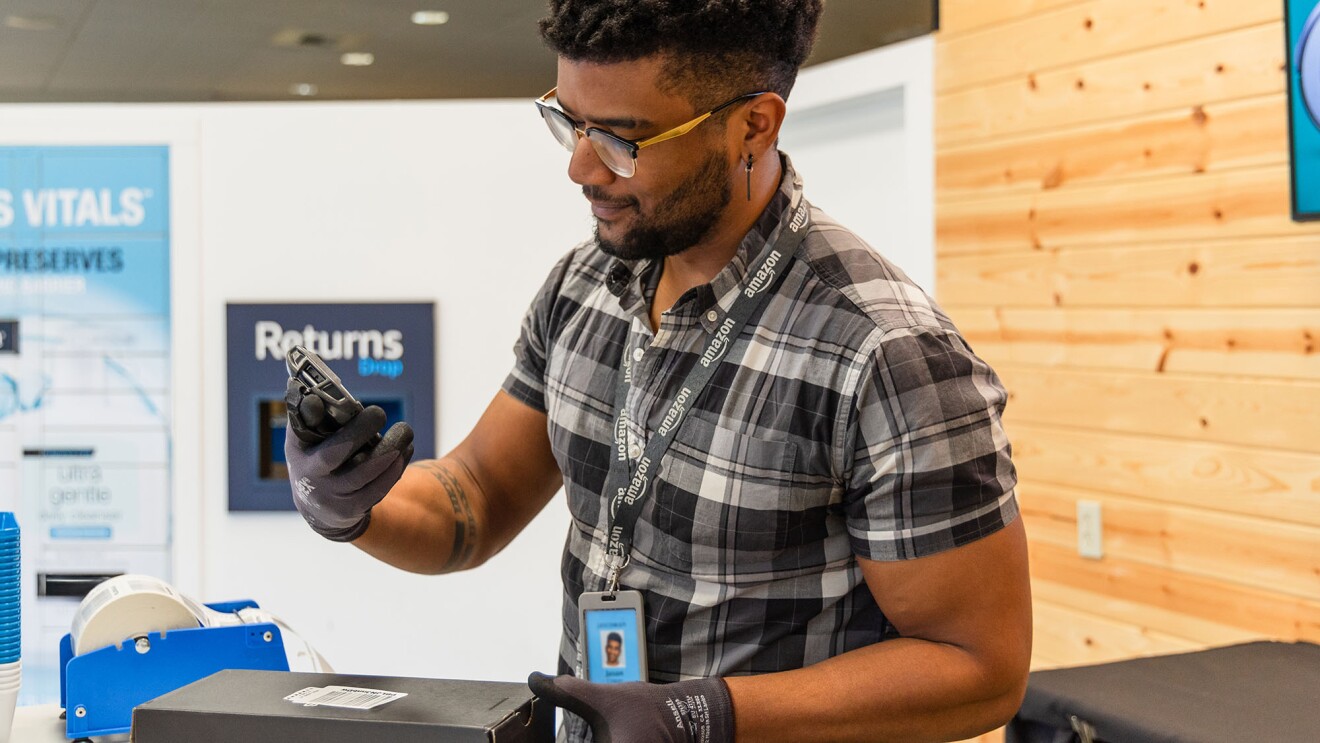A simple coffee break on an ordinary workday in 2019 played a pivotal role in Rachad Lewis now being able to say, "I put my stamp on something, and I made a change within my community."
Along with Tiffany Johnson and Jeremy Erdman, Lewis makes up the trio of Amazon employees who stepped beyond their job descriptions and convinced a growing group of champions within the company that there was a need—and a viable plan—to help Black business owners succeed as selling partners in Amazon’s store.
Their teamwork culminated in the launch of Amazon's Black Business Accelerator (BBA)—a $150 million pledge that explicitly targets barriers to access, opportunity, and advancement created by systemic racism across America and provides capital, mentorship, and marketing support to thousands of Black-owned businesses.
But it wasn't so long ago that Lewis, Johnson, and Erdman didn't even know each other.
 Amazon employee Rachad LewisPhoto by LUCAS JACKSON
Amazon employee Rachad LewisPhoto by LUCAS JACKSONLewis was in the kitchen area of his floor in an Amazon office building. A co-worker who joined him for coffee pointed someone out and asked, "Hey, have you met Jeremy? He's the new program manager for diversity and inclusion."
The co-worker introduced Lewis to Erdman, and the two clicked—partly because Lewis is a member of Amazon's Black Employee Network (BEN), and Erdman was eager to connect with that affinity group. Erdman also mentioned that he was searching for ideas that could make a big difference for diversity, equity, and inclusion efforts inside the group of Amazon teams he serves. And that's why Erdman immediately popped to mind when one of Lewis's friends told him about a brainstorm of hers.
That friend was Johnson. A fellow BEN member, Johnson grew up in the South American nation of Guyana, where her parents ran a small business. At Amazon, she helped small business owners learn how to grow their businesses on Amazon by launching their products on the Amazon sites that serve customers in Canada and Mexico.
Her work yielded more opportunities for Amazon sellers and more unique products for Amazon customers outside the U.S. Seeing the results of Amazon’s partnership with hundreds of thousands of small businesses, a question kept surfacing for Johnson: "What if this was available to my community?"
 Amazon employee Tiffany Johnson had the original idea for what became the Black Business Accelerator.Photo by LUCAS JACKSON
Amazon employee Tiffany Johnson had the original idea for what became the Black Business Accelerator.Photo by LUCAS JACKSONBlack entrepreneurs have less access to capital, mentorship, and growth opportunities. They are also significantly underrepresented in retail. According to the U.S. Census Bureau, only 6% of U.S. retail businesses have a Black owner—even though Black Americans represent 14% of the U.S. adult population.
Maybe, Johnson thought, tailored outreach and support for Black businesses could hit the same sweet spot of increasing opportunity for up-and-coming entrepreneurs by helping them reach and delight Amazon customers. She shared her idea with Lewis, and Lewis—seeing its potential—told her about Erdman and how his door was wide open for new ideas around diversity, equity, and inclusion.
Looking back now on seeing Johnson's idea for the first time, Erdman remembers realizing that it was "much bigger" than what he was set up to tackle in his role. He saw that as a great thing, a classic case of an Amazon employee answering the call of the company's "Think Big" Leadership Principle, which states: "Thinking small is a self-fulfilling prophecy. Leaders create and communicate a bold direction that inspires results. They think differently and look around corners for ways to serve customers."
Johnson said, "I remember Jeremy saying to us 'Guys, I really love this idea. And I'm definitely going to support you.' He started scheduling all the meetings for us. He showed up every time. He came all the way in, and it was amazing."
Erdman, then, was the first ally for what became the BBA. Many more allies followed as the trio presented their research and solutions to groups of decision-makers at higher and higher levels of Amazon leadership.
"The data was so compelling," Erdman said. "I don't think there was really much of a question of if the project would happen. It was just when and in what form. With a lot of projects, there can be a fear of failure. This one didn't feel that way."
 Jeremy Erdman became the first of many allies for Tiffany Johnson's big idea.Photo by LUCAS JACKSON
Jeremy Erdman became the first of many allies for Tiffany Johnson's big idea.Photo by LUCAS JACKSONEverything took on added urgency when data showed Black small businesses were suffering disproportionate harm from the economic toll of the COVID-19 pandemic. There was the chance for the BBA to be a lifeline at a dire time, so a pilot project got greenlit faster than Johnson, Lewis, and Erdman expected, and then the full program launched last month.
Announcing the launch, Amazon Worldwide Consumer CEO Dave Clark wrote, "BBA and selling on Amazon unlocks a powerful and proven economic engine that enables entrepreneurs to build their brands and sell their products to our more than 300 million global customers. We know that customers value the wide selection and diversity of products offered by these businesses, and we are excited to see the offerings these new sellers will bring."
For Johnson, Erdman, and Lewis, launching the BBA is a thrilling milestone, but their priority is maximizing its impact in the real world.
"I'm excited to see how much we grow a lot of these Black-owned businesses and add to the economic empowerment of their communities," said Johnson, whose idea started it all. "When I speak to a lot of the business owners, there's that lack of awareness of how to sell on Amazon, what sort of resources are out there, and how to access that. I want this program to bridge that gap.”
She’s active in affinity groups beyond BEN and is especially happy that the launch announcement for BBA mentioned Amazon’s goal of creating similar programs for business owners from other underrepresented communities.
01 / 03
Trending news and stories
- Amazon unveils 7 new robots powering faster, safer deliveries: Go inside our most innovative delivery station yet
- Introducing Vulcan: Amazon's first robot with a sense of touch
- This new AI tech will make sorting packages easier for Amazon's delivery station employees
- 15 photos from Project Kuiper's first launch of low Earth orbit satellites












